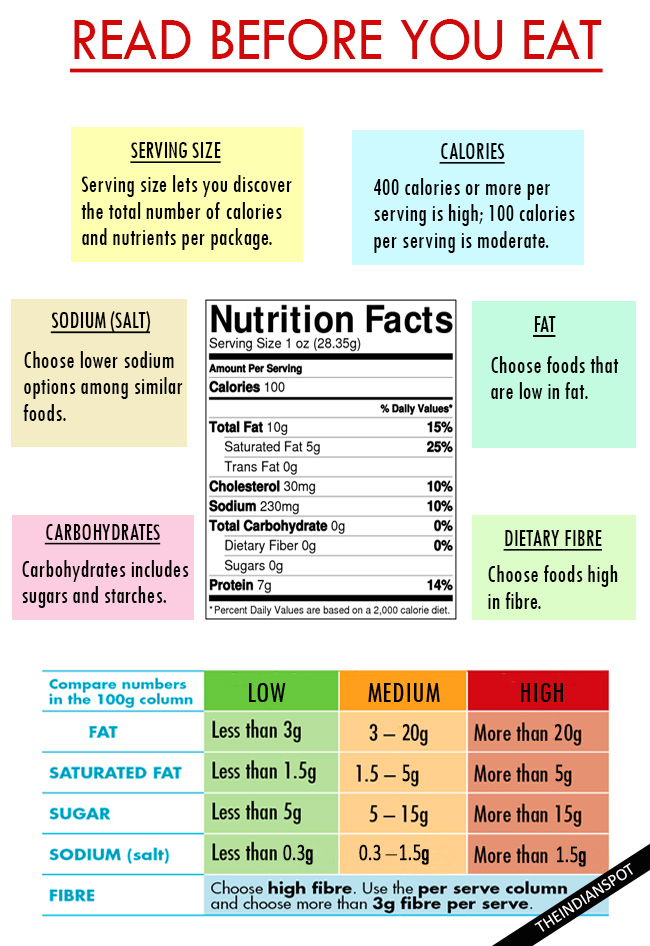How many of you read the food labels before purchasing them? Most of us certainly don’t do that. If you always read the food labels without fail before you consider buying that product, chances are you might be just scanning them without knowing what actually to look for. Food labels seem to provide all the information a thoughtful consumer needs but things get tricky when the food labels tell only the half story! Use this guide to help you understand the facts on food labels and make better choices while shopping . Here is what to consider while buying any foodstuff:
 SERVING SIZE AND CALORIES
SERVING SIZE AND CALORIES
We always check the term ‘calories’ on the food labels before buying them. But how would you know how much of the food amount gives you the right amount of calories you need? Calories are directly proportional to serving size. If you consume more calories than you burn, you gain weight. Always look out for serving size mentioned and then the calories mentioned.
CARBOHYDRATES
There are different types of refined sugars and artificial sweeteners that are added in processed foods. Always aim for less than 5 grams of sugar per serving. A health conscious person would always choose for labels containing the term ‘sugar-free’. But you are doing it all wrong. The foods claiming to be sugar-free always contain high amount of artificial sweeteners which have other side-effects. Avoid ingredients ending with ‘-ose’ like fructose, sucrose etc. Other names for added sugar: Dextrose, Fructose, Glucose, Golden Syrup, Sucrose, Malt, Maltose, Brown Sugar, Maple Syrup, Lactose.
SODIUM
The key things you need to look at on food labels are the following: serving size, calories per serving, fat, sodium, sugar, and cholesterol. For example frozen dinners and canned foods are VERY high in sodium. They are loaded with sodium to preserve the food. Other names for high salt ingredients: Baking Powder, Celery Salt, Garlic Salt, MSG, Rock Salt, Sea Salt, Sodium Bicarbonate, Stock Cubes, Yeast Extract.
FAT CONTENT
Fat content is always listed on any food label because the more the fats, the more are the calories offered by the foodstuff. Don’t always look out for total fat content, scan down a bit more. The fat-table is always listed on the food packaging containing information about saturated fats, trans fats, monosaturated and polysaturated fats. The first two kinds of fats are linked to heart diseases while the latter two are generally mentioned by some companies under the name ‘good’ fats which are beneficial for cardiovascular health.
DIETARY FIBRE
Choose foods high in fibre.
NUTRIENTS
Nutrients To Get More Of Get 100% DV of these: • Calcium • Dietary Fiber • Iron • Vitamins A & C
Nutrients To Get Less Of Get less than 100% DV of these: • Cholesterol • Saturated Fat • Sodium TIP Sugars and Trans Fat are nutrients to get less of, but they have no %DV. Use grams to compare!
MORE: 15 EVERYDAY FOODS YOU ARE EATING WRONG.
INGREDIENTS LIST
Ingredients are something even the less health-conscious people check. Always remember, the lesser the ingredients in your foods, the better it is for your health. Ingredients are listed from most to lease abundant, so the ingredients that are mentioned first are added in abundance while the latter ones are less. For example, if you are buying a ketchup, the ingredient listed first should be tomatoes and not water or other ingredients. And, when you see ingredients you cannot even pronounce, you may skip it without any second thought.
CHECK FOR ‘ALL-NATURAL’ AND ‘ORGANIC’
We all lookout for foodstuffs that claim to be ‘natural’ or ‘organic’. How many of you think the foods saying ‘natural’ and ‘organic’ are the same? Organic veggies are the veggies that are not grown by using synthetic fertilizers, pesticides or herbicides but only biofertilizers and natural insect repellents are used. Organic meat is the meat obtained from animals that eat organic feed and nutritious foods and are not on hormones or any other supplements. When you read the term ‘natural’ it means that the food does not contain any artificial ingredient. So, both the terms are not the same.
Traffic light rating system
| per 100 grams | low (green) | medium (amber) | high (red) |
| fat | up to 3.0 grams | more than 3.0 up to 20.0 grams | more than 20.0 grams |
| saturates | up to 1.5 grams | more than 1.5 up to 5.0 grams | more than 5.0 grams |
| sugar | up to 5.0 grams | more than 5.0 up to 15 grams | more than 15 grams |
| salt | up to 0.3 grams | more than 0.3 up to 1.5 grams | more than 1.5 grams |
Drinks
For drinks the colour-coding values for fat, saturated fat and sugars are lower because beverages are consumed in relatively high quantities.
| per 100 millilitre | low (green) | medium (amber) | high (red) |
| fat | up to 1.5 grams | more than 1.5 up to 10.0 grams | more than 10.0 grams |
| saturates | up to 0.75 grams | more than 0.75 up to 2.5 grams | more than 2.5 grams |
| sugar | up to 2.5 grams | more than 2.5 up to 6.3 grams | more than 6.3 grams |
| salt | up to 0.3 grams | more than 0.3 up to 1.5 grams | more than 1.5 grams |